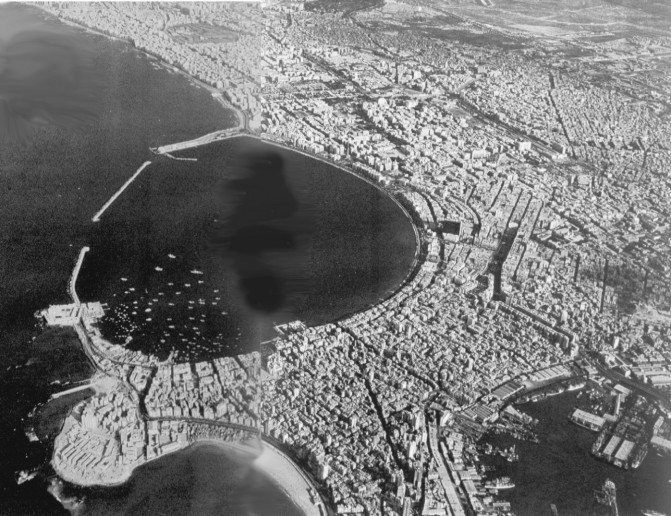
|
Alexandria |
Alexandria, the most important city of northern Egypt, was founded in 332 b.C. by Alexander the Great, king of Macedonia, who taking advantage of a particularly favourable geographic position, planned its construction and had it built as the most important harbour of the ancient world. Its main function was the dispatch of goods by sea.
Alexander's plan was to create a trade link between the Hellenic peninsula and northern Africa, which was then a very rich and fertile area where grain, cotton, sugar and wool were produced. These products would be conveyed to Alexandria, by waterways and by caravans, thus favouring large commercial exchange with goods crafted in Greece.
Not too far from the Nile's delta, Alexander found a fertile piece of land between Lake Mariotis (Mariut) and the Mediterranean Sea with a small island (Pharos) right in front of it.
Two gigantic works, by that age's standard, were necessary in order to carry out the project:
the connection of the island of Pharos and the mainland, constructed with stones and masonry works, almost 1.5 kilometre long (called Heptastadium meaning seven lengths, slightly longer than 200 metres each), thus creating the boundary for a very spacious harbour on one side and a second smaller harbour for fishing boats; a lighthouse, built on Pharos at a later time, became one of the seven wonders of the ancient world;
the excavation of a waterway (Mahmoudeya) connecting the harbour to lake Mariotis and the Canopic branch of the Nile, made possible the communication with southern Egypt.

Shortly after its foundation there were about 300,000 inhabitants in Alexandria, not counting slaves who could have been about 50,000. The inhabitants were mainly Greeks, Jews and Egyptians. The city extended about 6 kilometres along the seaside and followed the same basic rules by which today American cities are oriented, that is, large avenues crossed at 90° by streets. The most important streets were adorned by colonnades. The richest district of the city was the Brucheium located next to the main harbour. The most significant architecture works were the temple dedicated to the Egyptian goddess Serapis, the mausoleum of Alexander, the Temple to Poseidon, the museum, the theatre, the library, the market and, later, the Ptolemaic constructions.
Like all cities that grow and prosper Alexandria lived its age of splendour: it became the capital of Egypt and was renowned for its authoritative schools of philosophy, oratory and astronomy. At the beginning of the third century bc, Alexandria's library contained the ancient world's largest collection of books, counting nearly 500,000 papyruses; the library was destroyed several centuries later. Under Ptolemaic rule the City had become the literary and scientific centre of the ancient world.
After the defeat of Cleopatra and Marc Anthony (Actium 31 b.C.) the City lost its autonomy and was dominated by Roman rule and administration.
Due to the strategic position of the City - Alexander had well foreseen the importance that a harbour there could have - Alexandria continued in its ancient role of centre of trade and dispatch between the East and the West and entire fleets of ships carrying grain sailed from Alexandria towards Italy year after year. Nevertheless the City gradually lost its prosperity. In 116 a.C. a revolt instigated by the Jews caused their total annihilation and the destruction of most of the city; furthermore, in 215 a.C., the emperor Caracalla, for unknown reasons (possibly another Jewish revolt), ordered the massacre of all male inhabitants (as far as retaliation is concerned, the Romans did not behave differently than others better known today!).
Alexander the Great promoted the encounter of the Greek and Jewish cultures; in fact the basis for the philosophical evolution of the religious thought, according to the principles followed in the development of Hellenic thought, was laid at that time. The translation in Greek of the Old Testament also took place in Alexandria in that time period (100 a.C.).
Alexandria lost its historical significance in 646 a.C. after the destruction operated by the Arab General Amr Ibn Al As. From then on, its economical importance also diminished; initially due to competition with Cairo which had gained greatly in importance by 900 a.C. and then definitely in the fifteenth century when the sea routes were opened towards India which, together with China, had become important commercial partners with Europe. Alexandria had totally lost its role of reference link with the East. Many years later, in 1798, it was conquered by Napoleon (by then it had only about 20,000 inhabitants). The French dominion, even if it lasted only three years, was able to return Alexandria to the attention of the Western world. Subsequent British dominion gave Alexandria that "European aura" we have all come to know.
Today Alexandria has over five million inhabitants and is again Egypt's largest commerce and dispatch centre; today as in the past, cotton, grain, sugar and wool are the main products of trade.